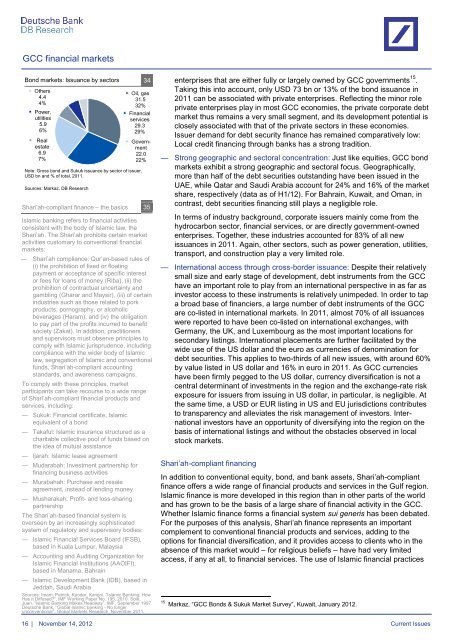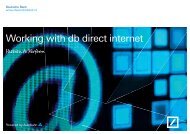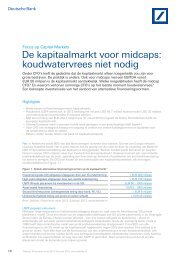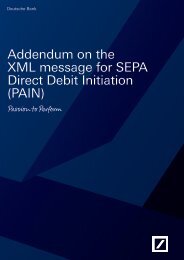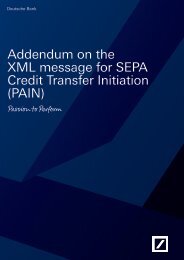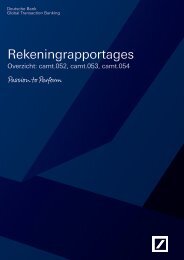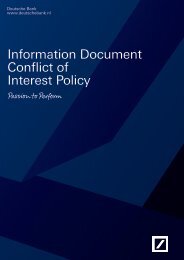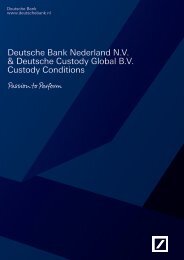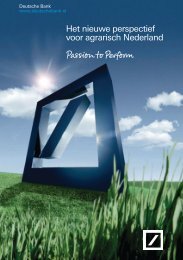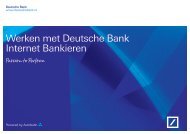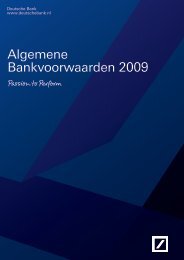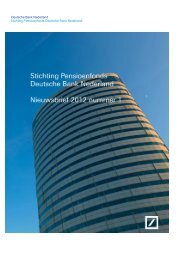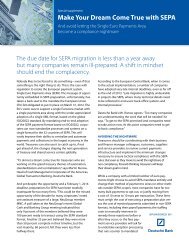GCC financial markets - Deutsche Bank Research
GCC financial markets - Deutsche Bank Research
GCC financial markets - Deutsche Bank Research
Create successful ePaper yourself
Turn your PDF publications into a flip-book with our unique Google optimized e-Paper software.
<strong>GCC</strong> <strong>financial</strong> <strong>markets</strong>Bond <strong>markets</strong>: Issuance by sectors 34Others4.44%Power,utilities5.96%Realestate6.97%Shari’ah-compliant finance – the basics 35Islamic banking refers to <strong>financial</strong> activitiesconsistent with the body of Islamic law, theShari’ah. The Shari’ah prohibits certain marketactivities customary to conventional <strong>financial</strong><strong>markets</strong>:— Shari’ah compliance: Qur’an-based rules of(i) the prohibition of fixed or floatingpayment or acceptance of specific interestor fees for loans of money (Riba), (ii) theprohibition of contractual uncertainty andgambling (Gharar and Maysir), (iii) of certainindustries such as those related to porkproducts, pornography, or alcoholicbeverages (Haram), and (iv) the obligationto pay part of the profits incurred to benefitsociety (Zakat). In addition, practitionersand supervisors must observe principles tocomply with Islamic jurisprudence, includingcompliance with the wider body of Islamiclaw, segregation of Islamic and conventionalfunds, Shari’ah-compliant accountingstandards, and awareness campaigns.To comply with these principles, marketparticipants can take recourse to a wide rangeof Shari’ah-compliant <strong>financial</strong> products andservices, including:— Sukuk: Financial certificate, Islamicequivalent of a bond— Takaful: Islamic insurance structured as acharitable collective pool of funds based onthe idea of mutual assistance— Ijarah: Islamic lease agreement— Mudarabah: Investment partnership forfinancing business activities— Murabahah: Purchase and resaleagreement, instead of lending money— Musharakah: Profit- and loss-sharingpartnershipOil, gas31.532%Financialservices29.329%Government22.022%Note: Gross bond and Sukuk issuance by sector of issuer,USD bn and % of total, 2011.Sources: Markaz, DB <strong>Research</strong>The Shari’ah-based <strong>financial</strong> system isoverseen by an increasingly sophisticatedsystem of regulatory and supervisory bodies:— Islamic Financial Services Board (IFSB),based in Kuala Lumpur, Malaysia— Accounting and Auditing Organization forIslamic Financial Institutions (AAOIFI),based in Manama, Bahrain— Islamic Development <strong>Bank</strong> (IDB), based inJeddah, Saudi ArabiaSources: Imam, Patrick, Kpodar, Kangni, “Islamic <strong>Bank</strong>ing: HowHas it Diffused?”, IMF Working Paper No. 195, 2010. Solé,Juan, “Islamic <strong>Bank</strong>ing Makes Headway”, IMF, September 1997.<strong>Deutsche</strong> <strong>Bank</strong>, “Global Islamic banking - No longerunconventional”, Global Markets <strong>Research</strong>, November 2011.enterprises that are either fully or largely owned by <strong>GCC</strong> governments 15 .Taking this into account, only USD 73 bn or 13% of the bond issuance in2011 can be associated with private enterprises. Reflecting the minor roleprivate enterprises play in most <strong>GCC</strong> economies, the private corporate debtmarket thus remains a very small segment, and its development potential isclosely associated with that of the private sectors in these economies.Issuer demand for debt security finance has remained comparatively low:Local credit financing through banks has a strong tradition.— Strong geographic and sectoral concentration: Just like equities, <strong>GCC</strong> bond<strong>markets</strong> exhibit a strong geographic and sectoral focus. Geographically,more than half of the debt securities outstanding have been issued in theUAE, while Qatar and Saudi Arabia account for 24% and 16% of the <strong>markets</strong>hare, respectively (data as of H1/12). For Bahrain, Kuwait, and Oman, incontrast, debt securities financing still plays a negligible role.In terms of industry background, corporate issuers mainly come from thehydrocarbon sector, <strong>financial</strong> services, or are directly government-ownedenterprises. Together, these industries accounted for 83% of all newissuances in 2011. Again, other sectors, such as power generation, utilities,transport, and construction play a very limited role.— International access through cross-border issuance: Despite their relativelysmall size and early stage of development, debt instruments from the <strong>GCC</strong>have an important role to play from an international perspective in as far asinvestor access to these instruments is relatively unimpeded. In order to tapa broad base of financiers, a large number of debt instruments of the <strong>GCC</strong>are co-listed in international <strong>markets</strong>. In 2011, almost 70% of all issuanceswere reported to have been co-listed on international exchanges, withGermany, the UK, and Luxembourg as the most important locations forsecondary listings. International placements are further facilitated by thewide use of the US dollar and the euro as currencies of denomination fordebt securities. This applies to two-thirds of all new issues, with around 60%by value listed in US dollar and 16% in euro in 2011. As <strong>GCC</strong> currencieshave been firmly pegged to the US dollar, currency diversification is not acentral determinant of investments in the region and the exchange-rate riskexposure for issuers from issuing in US dollar, in particular, is negligible. Atthe same time, a USD or EUR listing in US and EU jurisdictions contributesto transparency and alleviates the risk management of investors. Internationalinvestors have an opportunity of diversifying into the region on thebasis of international listings and without the obstacles observed in localstock <strong>markets</strong>.Shari’ah-compliant financingIn addition to conventional equity, bond, and bank assets, Shari’ah-compliantfinance offers a wide range of <strong>financial</strong> products and services in the Gulf region.Islamic finance is more developed in this region than in other parts of the worldand has grown to be the basis of a large share of <strong>financial</strong> activity in the <strong>GCC</strong>.Whether Islamic finance forms a <strong>financial</strong> system sui generis has been debated.For the purposes of this analysis, Shari’ah finance represents an importantcomplement to conventional <strong>financial</strong> products and services, adding to theoptions for <strong>financial</strong> diversification, and it provides access to clients who in theabsence of this market would – for religious beliefs – have had very limitedaccess, if any at all, to <strong>financial</strong> services. The use of Islamic <strong>financial</strong> practices15 Markaz, “<strong>GCC</strong> Bonds & Sukuk Market Survey”, Kuwait, January 2012.16 | November 14, 2012 Current Issues


